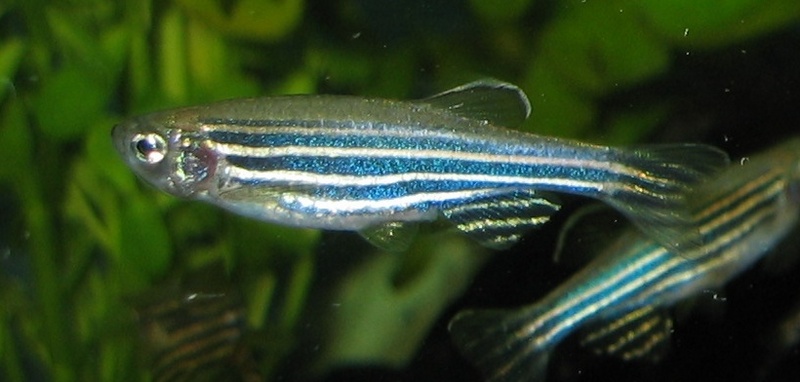Danio rerio
From Wikipedia, the free encyclopedia
[Photo] Zebrafish (Danio rerio). Photo taken by User:Azul http://en.wikipedia.org/wiki/en:User:Azul
The zebrafish (Danio rerio) is a tropical fish belonging to the minnow family (Cyprinidae). It is a popular aquarium fish and an important model organism.
Characteristics
The zebrafish arose in the Ganges region in Eastern India and is also native to Pakistan, Bangladesh, Nepal and Myanmar. It commonly inhabits streams, canals, ditches, ponds and slow-moving to stagnant water bodies, including rice fields.
The fish is named for its five uniform, pigmented, horizontal blue stripes on the side of the body, all of which extend to the end of the caudal fin. Males are torpedo shaped and have gold stripes between the blue stripes; females have a larger, whitish belly and have silver stripes instead of gold. The zebrafish grows to 3.8 cm, lives for around 5 years, and produces 300-500 eggs per spawning.
Recently, transgenic zebrafish have become commercially available that express green fluorescent protein or red fluorescent protein. Other varieties include leopard and longfin.
Aquarium Care
Zebrafish are hardy fish and considered good for beginner aquarists. Their ease of keeping and breeding, beauty, price and broad availability may all contribute to their popularity. However, they are susceptible to Oodinium, or Velvet disease, Microsporidia (Pseudoloma neurophilia),and mycobacterium species.
Zebrafish as an introduced species
Zebrafish have been introduced and become established in Japan and the United States. They have also been sighted in Colombia, presumably having escaped from an aquarium.
Model organism for development and genetics
D. rerio are a common and useful model organism for studies of vertebrate development and gene function because they reproduce very easily, passing from the egg to the larvae stage in less than three days. For genetic research groups, the zebrafish is an excellent test subject and is used in many labs to replace or to supplement higher vertebrate models, such as rats and mice. D. rerio is one of the few species of fish to have been flown into space (See Animals in space). Aided by the transparency of the embryo, if researchers modify the fish's genotype at the egg stage they can see resulting changes in organ shape or dynamics barely three days later. The arrival of zebrafish as a major model for studying developmental biology coincided with a large scale mutagenesis screen (commonly referred to as the T??bingen/Boston screens). The scholarly journal Development devoted an issue to research using the fish in celebration of this landmark. [1] A common reverse genetics technique is to knock down gene expression or modify splicing in zebrafish using Morpholino antisense technology; the journal Genesis devoted an issue to research using Morpholino oligos[2], mostly in D. rerio. A known problem with zebrafish is that the genome underwent a duplication after the divergence of ray-finned fishes and lobe-finned fishes, and it is not always easy to silence one of the two gene orthologs reliably.
In addition, zebrafish have the ability to regenerate fins, skin, the heart and the brain (in larval stages). Zebrafish have also been found to regenerate photoreceptors and retinal neurons following injury. (The exact mechanisms of this regeneration are still unknown, but they are currently being studied.) Researchers frequently cut the dorsal and ventral tail fins and analyze their regrowth to test for mutations. This research is leading the scientific community in the understanding of healing/repair mechanisms in vertebrates.
The results of genetic engineering in these fishes have been used to produce the Glofish, an aquarium pet with fluorescent pigments. Other varieties include golden, sandy and long fin fish.
In December 2005, a study of the golden strain identified the gene responsible for the unusual pigmentation of this strain as SLC24A5, a solute carrier that appears to be required for melanin production, and confirmed its function with a Morpholino knockdown. The orthologous gene was then characterized in humans and a one base pair difference was found to segregate strongly between fair skinned Europeans and dark skinned Africans. [3] This important study featured on the cover of the academic journal Science and demonstrates the power of zebrafish as a model organism in the relatively new field of comparative genomics.
Former names and synonyms
- Zebra danio
- Barilius rerio
- Cyprinus chapalio
- Brachydanio rerio
- Cyprinus rerio
- Danio lineatus
- Nuria rerio
- Perilampus striatus
http://en.wikipedia.org/wiki/Danio_rerio
| The text in this page is based on the copyrighted Wikipedia article shown in above URL. It is used under the GNU Free Documentation License. You may redistribute it, verbatim or modified, providing that you comply with the terms of the GFDL. |
|

